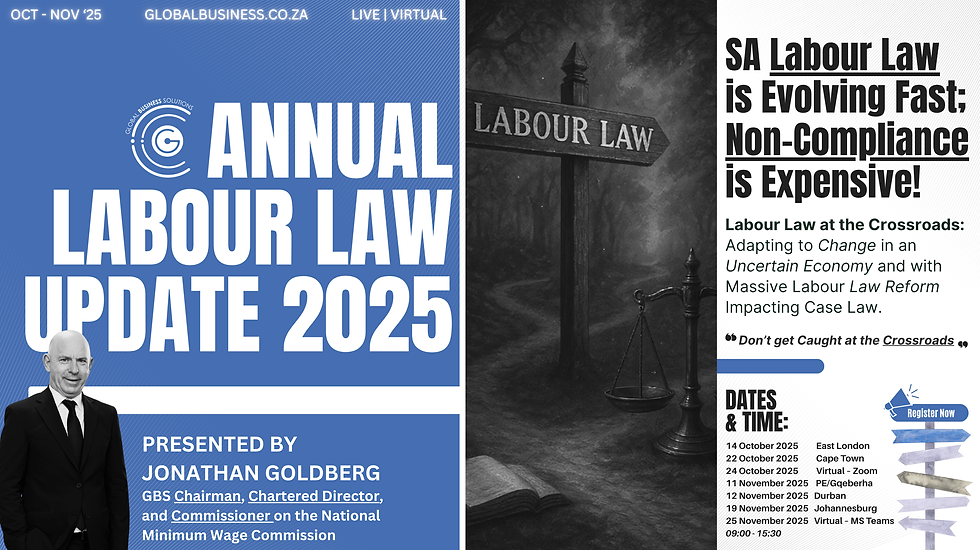Employment Equity Compliance in South Africa: Clarifying the Obligations of Designated vs. Non-Designated Employers
- John Botha

- Sep 10, 2025
- 3 min read

Effective employment equity (EE) is vital for fostering inclusive workplaces and redressing historical inequalities in South Africa. The Employment Equity Act (EEA) of 1998 as amended mandates specific compliance obligations for employers, depending on whether they are classified as designated or non-designated. Understanding these distinctions is crucial for businesses aiming to balance regulatory requirements with fair workplace practices.
Designated Employers vs. Non-Designated Employers: Who Qualifies?
Under the EEA, designated employers are those with 50 or more employees (denoted as 50+1). These employers must comply fully with the EEA’s provisions.
Non-designated employers have fewer than 50 employees (50-1) and generally have fewer statutory obligations under the Act, notably no need for compliance with chapter 3 of the said Act. However, some compliance measures still apply to them, especially if they seek formal recognition of compliance.
Core Compliance Obligations: A Comparative Overview
Compliance Obligation | Designated Employers (50+1) | Non-Designated Employers (50-1) |
Fair Discrimination | Yes | Yes |
EE Nominations and EE Committee (quarterly) | Yes | No |
EE Analysis (EEA12) and EE Plan (EEA13) | Yes | No |
EE Report online annually | Yes | No |
Appoint Senior Manager Responsible for EE | Yes | No |
Obtain a Certificate of Compliance | Yes | Yes (optional, with fewer requirements) * |
*Non-designated employers can obtain a certificate of compliance if they wish. This certificate attests that the employer pays the national minimum wage and has not been found guilty of unfair discrimination in the preceding 12 months. Unlike designated employers, they are not required to meet Chapter 3 reporting requirements.
Key Differences Explained
Fair Discrimination Applies to All
Both designated and non-designated employers must avoid unfair discrimination and harassment in employment practices. Compliance with fair discrimination principles is foundational and non-negotiable under South African labour law.
EE Committees and Nominations
Designated employers must establish Employment Equity Committees that meet quarterly. This committee plays a critical role in drafting and monitoring the EE plan, tracking progress, and resolving equity-related concerns. Non-designated employers are not obligated to have these committees, relieving them from this administrative burden.
Employment Equity Plans and Reporting
Designated employers must annually submit their Employment Equity Analysis (EEA12) and Employment Equity Plan (EEA13) to the Department of Employment and Labour via the online reporting system. This transparency helps the department monitor progress and enforce compliance. Non-designated employers do not have to produce or submit these reports, but they may implement their own internal equity measures voluntarily.
Senior Manager Appointment
Designated employers are required to appoint a senior manager responsible for EE to demonstrate accountability at the highest organizational level. This mandatory appointment is a clear signal of commitment to equity goals. Non-designated employers do not have this obligation.
Broader Context and Practical Implications
The differentiated compliance obligations aim to balance rigorous enforcement with minimizing administrative pressure on smaller employers. According to the Department of Employment and Labour, designated employers contribute most significantly to the workforce composition, justifying closer oversight. Meanwhile, non-designated employers are often small to medium-sized enterprises (SMEs) where strict reporting could be disproportionately costly.
Employers are encouraged to adopt good employment equity practices even if not strictly required, as demonstrated in studies that link diverse workplaces to improved innovation, employee satisfaction, and market competitiveness.
Join us at the Annual Labour Law Update. This year's theme is Labour Law at the Crossroads: Adapting to Change in an Uncertain Economy and with Massive Labour Law Reform Impacting Case Law. What you'll gain:
Master the Digital Transformation of Labour Law in 2025
200+ Labour Law Cases Unpacked by Jonathan Goldberg
Critical Updates on Upcoming Legislation & NEDLAC Amendments
Navigate Workplace Challenges from the Digital Era to Discrimination Laws

View our upcoming events: Upcoming Events, like the Employment Equity Reporting, Effective Strike Management or Social Media in the Workplace.
*All workshops are offered as customised in-house training that can be presented virtually or on-site.
"Global Business Solutions (GBS)—Your Partner in Strategic HR Compliance"



Comments